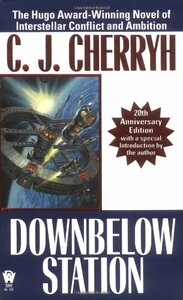Take a photo of a barcode or cover
adventurous
dark
emotional
tense
medium-paced
Brilliantly written adventure about a space station caught between two armies. I loved it.
challenging
emotional
hopeful
reflective
medium-paced
challenging
dark
tense
medium-paced
Plot or Character Driven:
Plot
Strong character development:
No
Loveable characters:
No
Not every book is for every person … and that’s okay.
Let’s say you drew a linear spectrum of space opera with character-driven at one end and plot-driven at the other.
At the one end, you’d have compelling, fully fleshed, flawed but deeply human characters with no plot – a la The Long Way to a Small, Angry Planet. At the other end, you’d have elaborate, intricate plots strung together by cardboard characters – in other words, this book.
Let’s say you drew a linear spectrum of space opera with character-driven at one end and plot-driven at the other.
At the one end, you’d have compelling, fully fleshed, flawed but deeply human characters with no plot – a la The Long Way to a Small, Angry Planet. At the other end, you’d have elaborate, intricate plots strung together by cardboard characters – in other words, this book.
adventurous
dark
mysterious
sad
tense
slow-paced
Plot or Character Driven:
Plot
Strong character development:
Complicated
Loveable characters:
No
Diverse cast of characters:
Yes
Flaws of characters a main focus:
No
tense
medium-paced
Plot or Character Driven:
A mix
Loveable characters:
Yes
Diverse cast of characters:
Yes
Claustrophobic. Fearful. Almost devoid of strong positive emotions. Sound familiar in this day and age?
You'd think a book structured around these emotional states would be unreadable, and yet Cherryh's awesomely influential and powerfully delivered novel creates a world of grey violence without malevolence and yet with great despair and devastation. It's quite timely in some ways to see the failures of liberal, law-driven universalists at the hands of corrupt oligarchic capitalists on the one hand, totalitarian, scientific rationalists on the other, and their own blind ignorance of their venal hypocrisy at the rotten core. If that sounds dry, well, in practice Cherryh wraps her story of clashing powers around a station-master's family saga with many compelling features.
There are flaws - the metallic grey one of them. Another would be the novel's indulgence in Noble Savage tropes to an alarmingly and almost clearly unintentionally comic way. And then there's the ultimate resolution, which seems rather neat but also out of keeping with the actual narrative consequences suggested by the immense violence conducted within the novel. On the political level, the liberal "nice" family comes out up top through a jury-rigged alliance with individualistic and Draconian military forces - so far, so much the '80s. But it's hard to digest the sufferings in the background.
But the successes triumph. Everything from your Deep Space Nines to your novels of the Expanse owe a great deal to the model Cherryh provides here of a space station under stress and navigating triangular forces to dramatic avail. The structural force of life's immobility being pummelled by the unpredictable and deadly forces of the void - space - are simply too powerful not to be capitalized on. And here they're all present in their brutal original forms. Amazing.
What a novel to end 2020 on.
You'd think a book structured around these emotional states would be unreadable, and yet Cherryh's awesomely influential and powerfully delivered novel creates a world of grey violence without malevolence and yet with great despair and devastation. It's quite timely in some ways to see the failures of liberal, law-driven universalists at the hands of corrupt oligarchic capitalists on the one hand, totalitarian, scientific rationalists on the other, and their own blind ignorance of their venal hypocrisy at the rotten core. If that sounds dry, well, in practice Cherryh wraps her story of clashing powers around a station-master's family saga with many compelling features.
There are flaws - the metallic grey one of them. Another would be the novel's indulgence in Noble Savage tropes to an alarmingly and almost clearly unintentionally comic way. And then there's the ultimate resolution, which seems rather neat but also out of keeping with the actual narrative consequences suggested by the immense violence conducted within the novel. On the political level, the liberal "nice" family comes out up top through a jury-rigged alliance with individualistic and Draconian military forces - so far, so much the '80s. But it's hard to digest the sufferings in the background.
But the successes triumph. Everything from your Deep Space Nines to your novels of the Expanse owe a great deal to the model Cherryh provides here of a space station under stress and navigating triangular forces to dramatic avail. The structural force of life's immobility being pummelled by the unpredictable and deadly forces of the void - space - are simply too powerful not to be capitalized on. And here they're all present in their brutal original forms. Amazing.
What a novel to end 2020 on.
adventurous
informative
reflective
slow-paced
Plot or Character Driven:
A mix
Strong character development:
Complicated
Loveable characters:
Yes
Diverse cast of characters:
Complicated
Flaws of characters a main focus:
Complicated
Yeah, I messed up and read this book because I didn't know it was part of a series. Too many focalisers, the info dump at the beginning was hard to stomach and soooo much world building that overwhelmed me. Guess I should check if it's really book 1 when reading next time. Content-wise the scope and intricacy of space politics was fascinating but the book overwhelmed me.
dark
emotional
tense
slow-paced
Plot or Character Driven:
A mix
adventurous
dark
hopeful
tense
fast-paced
No lies, this book was not an easy read. The plot is phenomenal, the characters interesting but the writing style was off in places. Sentence structure drove me crazy a few times and I couldn’t pick up on terminology based on context. I am still not sure what an “armscomper” is.
For me the set up for the crisis took too many pages. I understand she meticulously built the world, but too much is too much. I completely understand why some people really like this book, as I said, the plot and characters are excellent. I also understand why some people don’t like it, the first 200 pages (approximate) drag on forever.
For me the set up for the crisis took too many pages. I understand she meticulously built the world, but too much is too much. I completely understand why some people really like this book, as I said, the plot and characters are excellent. I also understand why some people don’t like it, the first 200 pages (approximate) drag on forever.



